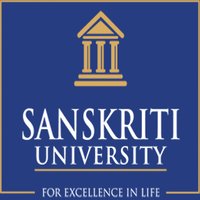BITSAT 2025
Institute of Eminence (IOE) by Govt. of India | Merit Based Scholarships | Ranked #20 by NIRF | Last Date: 18th Apr'25 | Apply Now
M.Sc. in Microbiology is a postgraduate degree programme in the field of science that emphasises the research and study of microorganisms, such as viruses, fungi, bacteria, and other microscopic living forms. M.Sc. in Microbiology is a branch of biology that explores these creatures' behavior, structure, and roles in different ecosystems as well as their effects on biotechnology and human health. Microbiology course at the postgraduate degree level covers subjects such as microbial genetics, immunology, epidemiology, and biotechnology.
Students enrolled in an M.Sc. Microbiology course develops their understanding of microbiological concepts through coursework, research projects, and laboratory practice. M.Sc. Microbiology graduates can work in research, environmental science, pharmaceuticals, healthcare, and agriculture fields. In fields including food safety, illness prevention, vaccine research, and the creation of cutting-edge biotechnological applications, microbiologists are essential.
Particulars | Values |
Degree Name | M.Sc Microbiology |
Degree Type | Postgraduate |
Degree Duration | 2 years |
Entrance Exams | IPU CET, BITSAT, CPGET |
Eligibility Criteria | Successful completion of BSc degree with a minimum of 50 per cent of marks |
Admission process | Merit/ Entrance Examination |
Fees for the entire duration | Rs. 24000 to Rs. 105000 |
Average Salary | Rs. 311,252 |
Job profiles | Clinical microbiologist, bacteriologist, virologist, mycologist, parasitologist |
Top recruiters | Biocon, Abbott India, Dr. Reddy’s, Ranbaxy, Cipla, Lupin |
The eligibility criteria to enroll in an M.Sc. Microbiology varies from institute to institute. We have provided below the details of minimum eligibility criteria for M.Sc. Microbiology admissions.
The admission process for enrollment in M.Sc. Microbiology varies from college to college. Several colleges conduct entrance examinations to select eligible students to provide admissions while several other colleges provide admissions on a 10+2 merit basis. The admission process may include several rounds described below.
Those who qualify all three rounds are provided with admission in the M.Sc. microbiology programme.
IIT JAM: IIT JAM or Joint Admission Test for M.Sc Programmes is a university-level entrance examination conducted by IIT Madras For admissions to the M.Sc course. Candidates can apply for the IIT JAM entrance exam by visiting the official website of the institution.
CUET PG: CUET PG or Common University Entrance Test-PG is a national-level entrance examination conducted by NTA (National Testing Agency) for admission to various master's degree programmes. The score of the CUET-PG entrance examination is accepted by 47 central universities in India.
The cutoff for admission to MSc Microbiology depends on the college's admission process. Candidates can view it on the official website of the particular college or university once the entrance exam is over. These cutoff points are usually not made public. The MSc Microbiology cut-off is determined by the college and takes into account a number of fundamental elements, including category, entrance exam score, and others.
There are several in-built skill sets required to enrol in an MSc Microbiology programme to progress with the learning experience and establish a successful career. One can upgrade his or her knowledge and skills by being enrolled in the course. We have provided below the major MSc Microbiology skills.
Communication Skill | Organising Skills |
An Eye to Detail | Patience |
Time Management | Teamwork |
Project Work | Leadership |
Critical Thinking | Decisive Skills |
The academic curriculum of the M.Sc. Microbiology programmes may vary from institute to institute. In the table below, we have provided the MSc Microbiology syllabus of Jiwaji University, Gwalior.
1st Semester | |
| Basics in Microbiology and General Bacteriology | Lab Course II |
| Virology and Mycology | Seminar |
| Cell biology and Biochemistry | Assignment/personality development/ Skill development activity |
| Bioinstrumentation | Comprehensive Viva Voce |
| Lab Course I | - |
2nd Semester | |
| Microbial Genetics and Molecular Biology | Lab Course IV |
| Immunology | Seminar |
| Microbial Physiology and metabolism | Assignment/personality development/ Skill development activity |
| Biostatics, Computer Application and Bioinformatics | Comprehensive Viva Voce |
| Lab Course III | - |
3rd Semester | |
| Medical and Pharmaceutical Microbiology | Lab Course V |
| Fermentation and Microbial Technology | Seminar |
| Recombinant DNA Technology | Assignment/personality development/ Skill development activity |
| Environmental Microbiology | Comprehensive Viva Voce |
| Lab Course V | - |
| 4th Semester | |
| Agriculture Microbiology Food Microbiology | Assignment/personality development/ Skill development activity |
| Lab course VII A/ B | Project Work |
| Seminar | Comprehensive Viva Voce |
The fee for the academic course M.Sc. Microbiology varies from college to college. Private colleges are likely to charge more fees as compared to government colleges. The average fee for M.Sc. Microbiology course ranges from Rs. 10,000 to Rs. 35,000 per annum.
There are numerous opportunities ahead for graduates of M.Sc Microbiology. The scope has risen up for M.Sc. microbiology graduates with the emergence of COVID. The demand for researchers has constantly been increased to determine whether its existence in the human ecosystem is natural or man-made. Such mysterious diseases caused by microorganisms and parasites have raised the demand for skilled microbiologists to diagnose, prevent and treat these diseases by developing appropriate drugs. Individuals may also opt for an M.Phil. or PhD. in microbiology to conduct study independently or opt for an academic career as a professor and provide lectures in microbiology colleges and universities.
There are so many career opportunities for M.Sc. Microbiology graduates. We have provided the prominent career options that aspiring individuals can opt to add to the more research-based studies on the activities of existing microorganisms in the environment.
Bacteriologist: A bacteriologist is a scientist who conducts research experiments on bacteria and analyses its reaction when exposed to a certain environment. He or she learns and gathers information on ecology, behaviour, reproduction and metabolism of bacteria.
Virologist: A virologist is a specialised microbiologist who conducts studies on viruses. He or she plans experiments to analyse the biology of viruses, the reaction to antiviral drugs, biochemistry, physiology and distribution.
Mycologist: A mycologist is a research professional responsible for studying the fungus and its biochemical properties, genetics, harmful effects and usage. A medical mycologist researches to treat fungal infections through drugs while agricultural and research mycologists conduct research to study the industrial and economic usage of fungi.
Clinical Microbiologist: A clinical microbiologist is a professional responsible for conducting research to prevent infectious diseases caused by microorganisms such as bacteria, viruses and fungi.
| Biocon | Ranbaxy |
| Abbott India | Cipla |
| Dr. Reddy’s | Lupin |
A M.Sc. in microbiology provides numerous opportunities in various fields such as education, healthcare, pharmaceutical and agriculture. Graduates can find career opportunities in both the private as well as public sectors. The agriculture sector also demands skilled professionals for microbiological research on subjects like rhizosphere, nitrogen fixation, bio-gas production, soil enzymes and anaerobic decomposition. The top employers for M.Sc. Microbiology includes healthcare organisations, forensic science laboratories, pharmaceutical companies, food and drugs and various other industries.
The salary offered to graduates of M.Sc. Microbiology varies depending on various factors. The college from which an individual has completed his or her graduation is considered depending on the college rating and quality of education provided in it. The other factors include individuals’ skills, knowledge and interests. The geographical location of the college and its size also affects the salary. We have provided below the details of the expected M.Sc. Microbiology salary.
Experience | Salary (per annum) |
1-4 years | Rs. 302126 |
5-9 years | Rs. 431338 |
10-19 years | Rs. 603594 |
There are numerous colleges in India that offer admissions in the M.Sc Microbiology programme. The academic curriculum of M.Sc Microbiology and fees may vary depending on the state and college authorities involved in designing the structure of M.Sc. Microbiology and the management of the college. We have provided below a list of top M.Sc. Microbiology colleges in India
College | Fees |
Rs.149,100 | |
Rs. 141,723 | |
Rs. 44000 | |
Rs. 160,000 | |
Rs. 50,700 | |
Rs. 34,980 | |
Rs. 53,970 | |
Rs. 168,000 | |
Rs. 168,000 | |
SNMC Jodhpur - Dr Sampurnanand Medical College | Rs. 6,000 |
There are both types of colleges private as well as govt. colleges. The management and the financial model of these colleges determine their nature as private or government. The private colleges are usually managed by the funds of trustees and fees collected from students.
College | Fees |
Rs. 224,700 | |
Rs. 250,000 | |
Rs. 29,729 | |
Rs. 250,000 | |
Rs. 65,610 | |
Tuljaram Chaturchand College of Arts, Science and Commerce, Baramati | Rs. 76,370 |
Rs. 160,000 | |
St Aloysius College, Jabalpur | Rs. 50,700 |
Shri Shivaji College of Arts Commerce and Science, Akola | Rs. 34,980 |
Deogiri College, Aurangabad | Rs. 53,970 |
Government colleges are managed by the state or central government. The facilities in these colleges are provided by the revenue tax collected from people to provide educational facilities. The fee charged from students is lesser as compared to that of private colleges. We have provided below top government M.Sc. microbiology colleges in India.
College | Fees |
SNMC Jodhpur - Dr Sampurnanand Medical College | Rs. 6,000 |
Rs. 79,550 | |
Rs. 49,186 |
The minimum required qualification to enroll in M.Sc Microbiology is successful completion of BSc in biology, biochemistry or any other relevant specialisation with an aggregate of 50 per cent of marks from a recognised university.
The academic fee of M.Sc Microbiology varies from college to college. The average fee of M.Sc Microbiology ranges Rs. 8000 to Rs. 35,000 per annum.
The various industries providing employment opportunities to M.Sc Microbiology graduates include healthcare, pharmaceutical, clinical research, food processing and agriculture industries.
The average offered salary to M.Sc Microbiology graduates is Rs. 311,252 per annum.
The top M.Sc Microbiology recruiters are listed below:
Biocon
Abbott India
Dr. Reddy’s
Ranbaxy
Cipla
Lupin
Hello there,
Yes, IISc Bangalore offers admission to its
4-year B.Sc. (Research)
program through the
IISER Aptitude Test (IAT)
, but
not
a direct 5-year B.Sc.-M.Sc. integrated course via IAT.
Key Points:
Program Offered
: 4-year B.Sc. (Research) with option to extend for 1-year M.Sc.
Admission via IAT
: Apply for IAT and also separately on
IISc admission portal
.
Course Structure
: First 3 semesters - common subjects, later specialization and research projects.
Eligibility for M.Sc. Extension : Based on academic performance during B.Sc.
Note
: IISc application opens from May 1 to June 6, 2025.
I hope this answer helps you. If you have more queries, then feel free to share your questions with us, we will be happy to assist you.
Thank you, and I wish you all the best in your bright future.
Hi navitha
In Kharar, Punjab, MSc students typically have hostel options at Panjab University and Chandigarh University. These hostels offer various room types, with fees ranging from Rs. 106,800 to Rs. 168,000 per annum for non-AC rooms and Rs. 1746 to Rs. 2880 for AC rooms.
Thanks.
Hi
Yes, for admission to the MSc program in Bioinformatics at the Institute of Bioinformatics and Applied Biotechnology (IBAB), having Mathematics in 11th and 12th standard is generally considered a requirement.
Thanks
Hi riya
https://admission.nfsu.ac.in/pdf/NTA%20ENTRANCE%20EXAM%20SYLLABUS%20(1).pdf
This is syllabus link
It including a mix of general aptitude and knowledge areas, as well as specific topics related to forensic science and mass communication for certain programs.
And as it is of 100 marks exam and every year competition increases so you have to score more than 85 for good government college.
Thanks
Hello Annu,
digital forensics is a strong career choice with growing scope in cybersecurity, law enforcement and corporate investigations. since you're already studying forensic science and starting cyber forensics, you're on the right track to build skills in networking, ethical hacking, and digital tools. consider certifications like CEH or CHFI, and pursue MsC digital forensics for deeper specialization and better placements.

MSc Finance and MSc International Management Admissions 2025 Now Open | Ranked Among the Top 100 Universities in the World by QS World University Rankings 2025 | Last Date: 28th Apr'25

100+ Industry collaborations | 10+ Years of legacy

Best innovation and research-driven university of Uttar Pradesh
Approved by UGC | Robust Placement Assistance
NAAC A Grade | Trans-Disciplinary Approach | Global Diversity
MAHE Ranked No. 1 Private University in India by QS World | #4 in India by NIRF 2024